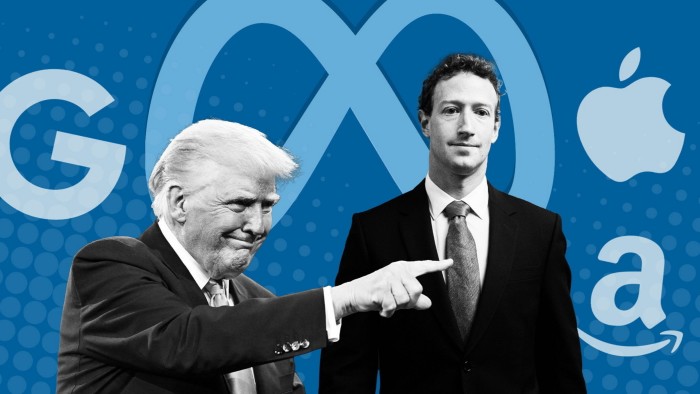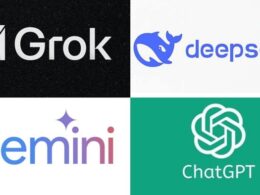Mark Zuckerberg marched at San Francisco’s gay pride parade more than a decade ago, waving from a float topped by a rainbow flag and stamping the arms of those in the crowd with a picture of the company’s “like” symbol.
Following the re-election of Donald Trump this year, the Meta chief has called for more “masculine energy” in the workplace, while eliminating some safeguards against hate speech across his apps.
Zuckerberg is at the vanguard of a dramatic reversal in attitudes across Silicon Valley, whose traditionally liberal workforces have been shocked by a broad backlash against diversity policies and employee dissent.
According to interviews with multiple current and former tech workers as well as academics, there has been little protest from left-leaning staff against the founders and chief executives of Meta, Amazon, Apple and Google who were all prominently seated behind Trump during his inauguration.
These people said many staff were fearful of a less secure job market following hundreds of thousands of tech lay-offs in 2023 and 2024.
Some insiders noted the recent policy changes had even been welcomed by certain younger, predominantly male, staff who leaned right, or ignored by more apolitical staff including some international employees on company-sponsored visas.
“Meta staff would previously erupt in outrage over whatever was the issue that week or month”, one former senior employee said. “Now it feels like there’s silence.”
The tepid reaction to the public shows of support for the new president has led some to bemoan the slow death of activism in Silicon Valley.
“In the 2010s, there was a sense that Silicon Valley was different, it had a rarefied culture,” said Alison Taylor, a clinical associate professor at NYU Stern School of Business focused on corporate responsibility. “Now you’re just like any other union-busting top-down conglomerate.”
For others, the change was necessary. “I don’t want a bunch of snot-nosed brats on the west coast telling me what I can or can’t say online,” said one senior tech lawyer. “Things had gone way too far.”
As scrappy start-ups, companies such as Google and Meta attracted talent with the promise of transparency and open debate at weekly all-hands meetings.
In 2018, Google was chastened after thousands of employees walked out in protest against the lenient treatment of senior men accused of sexual misconduct.
At Apple in 2021, a staff revolt dubbed the “AppleToo” movement drew attention to the iPhone-maker’s secretive culture and policies around unionising, pay transparency and harassment. The National Labor Relations Board, the federal agency that protects workers’ rights, has since filed multiple complaints accusing the company of labour law violations, including retaliation against employees who spoke out. Apple disputes the claims.
During the pandemic, hundreds of Meta staff staged “virtual” walkouts after the company did not take down inflammatory posts by Trump during his first term in office.
Now, even minor acts of activism are being stifled, according to current and former tech staffers.
At Google, an internal pride portal used by staff to promote and co-ordinate LGBTQ events, has recently disappeared. Amazon and Google parent Alphabet have pared back diversity, equity, and inclusion (DEI) commitments and have deleted internal groups promoting LGBTQ issues. Google said it had been reviewing its diversity efforts “following recent court decisions and executive orders on this topic”.
Cher Scarlett, a software engineer and one of the leaders of the AppleToo movement, whose NLRB complaint is still awaiting trial, said she had seen Apple staff on a private online forum say “things that really shocked me: ‘we should see how [the Trump presidency] plays out,’ or ‘maybe it is the best thing’.”
At Meta, staff have been expressly warned that anyone caught divulging company information to the press would be fired, and Q&A sessions with Zuckerberg are now closely vetted. Earlier this month. the company said it would cut 5 per cent of its staff, with Zuckerberg saying that the “lowest performers” would be targeted.
While Meta’s internal messaging boards continue to be flooded with debate, its community relations team has deleted certain criticism, citing rules around staff contributing to a “respectful workplace”, several people said.
One such example was the removal of offensive posts about the appointment of Trump confidant Dana White to Meta’s board in January. The UFC boss made a public apology in 2023 after a video surfaced of him slapping his wife in a Vegas casino. Meta declined to comment.
There has been a smattering of high-profile departures. Last month, Roy Austin, Meta’s vice-president of civil rights, announced that he was leaving, while the head of environmental, social, and governance (ESG) has also departed.
Overall, the response has been muted, without the protests, petitions or open letters common during other periods of turmoil.
“Is there a group of techno-libertarians that is more vocal and that has had significant financial success? Absolutely.” said Ro Khanna, a congressman and California Democrat whose district includes parts of Silicon Valley.
“And there are younger entrepreneurs in their thirties and forties who are influenced by that group. But there is a debate where the vast majority in Silicon Valley still believe in climate change, still believe in constitutional government, still believe in the benefits of having immigration.”
Ariella Steinhorn, a former Uber communications official who now runs a media company supporting whistleblowers, said: “The super vocal activist types will never go to work for tech companies again — they have to be on the outside.
“The vast majority are not drinking the Kool-Aid, they are not activists — but they are conflicted.”
Those who remain suggested the silence came as few wanted to be blacklisted as a troublemaker or lose a well-paid job when the tech market is more saturated.
“With the exception of engineers, nobody could dream of the compensation that they’re getting [were they to move] elsewhere,” said one former senior Meta employee. “They’ve got the velvet handcuffs.”
For international staff in the US on company-sponsored visas, who are threatened with losing their immigration status if they lose their jobs, the stakes are even higher. “We joke about the coders on H1B visas having a noose around their necks”, one tech employee said.
Still, some envisage that the cultural pendulum will swing back. “My hope is that there will be a moment of moral clarity, where these companies will realise they can’t go along with the Trump agenda,” said Khanna. “If there is a constitutional crisis, I would hope these tech leaders would stand with us.”
Additional reporting by Rafe Uddin and Cristina Criddle in San Francisco
Source link









